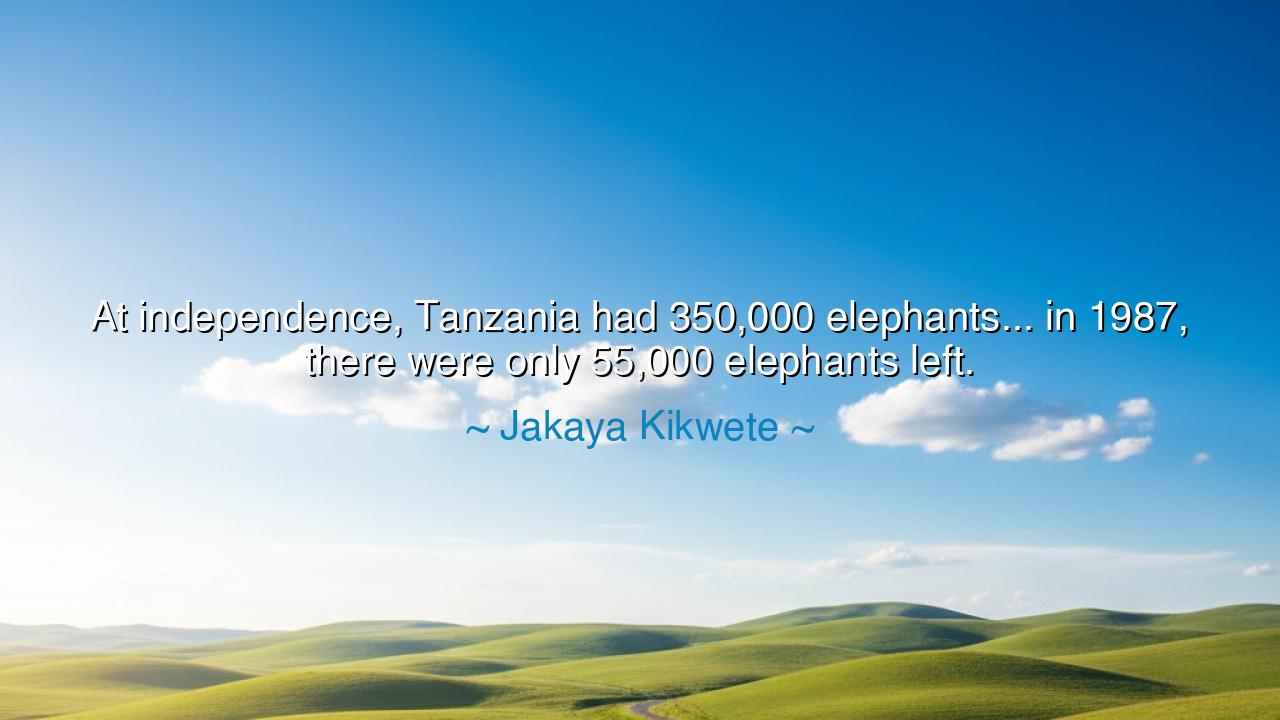
At independence, Tanzania had 350,000 elephants... in 1987, there
At independence, Tanzania had 350,000 elephants... in 1987, there were only 55,000 elephants left.






“At independence, Tanzania had 350,000 elephants... in 1987, there were only 55,000 elephants left.” — Jakaya Kikwete
These are not merely words of lamentation, but the solemn testimony of a guardian of the earth, Jakaya Kikwete, former President of Tanzania. In this stark declaration, he speaks not only of numbers lost, but of a wound inflicted upon the spirit of a nation — and upon the great continent itself. The elephant, ancient and wise, is not just an animal of the plains; it is a living emblem of Africa’s majesty, endurance, and memory. To speak of its decline is to speak of the fading of something sacred — a warning that humanity’s greed and negligence can silence the very heartbeat of creation. Kikwete’s words echo through time as both mourning and prophecy: that when the giants of the wild fall, the ground itself remembers the tremor.
The meaning of this quote stretches far beyond conservation or the tragedy of lost creatures. It is a meditation on stewardship, on the sacred duty of humanity to guard what it did not create but inherited. Kikwete reminds us that independence — the freedom of a nation — means little if it is not accompanied by the independence of nature, the freedom of forests and rivers and the creatures that dwell within them. When Tanzania stood newly born in 1961, she inherited not only land and people, but a living tapestry of wilderness, where elephants roamed as freely as the winds. Yet in the decades that followed, as human ambition grew unchecked, the wilderness shrank. The tusks of elephants became the trophies of vanity, their bodies the price of human indulgence. And thus, freedom for man became captivity for nature.
The origin of these words lies in the painful story of Africa’s struggle against poaching and the global ivory trade — a war waged not only against animals, but against the soul of a continent. In the decades after Tanzania’s independence, the world’s appetite for ivory became insatiable. Traders and hunters, many from beyond Africa’s shores, turned elephants into currency, their ivory carved into trinkets of wealth and power. Villages and rangers fought to protect them, but the forces of greed were vast and armed. By 1987, the herds that once shook the Serengeti were reduced to a fraction of their glory. Kikwete’s words, spoken years later, carry the weight of that history — a reminder that the independence of nations cannot stand alone if the land itself is enslaved to destruction.
There is a story that captures this truth, one told often among conservationists: the story of Ngorongoro, where elephants once moved like shadows beneath the mountains. In the 1970s, as poachers came in waves, one old matriarch — known by her watchers as Mama Tembo — led her herd across hundreds of miles in search of safety. Each year, their numbers grew smaller. When she was found dead, her ivory hacked away, the younger elephants returned to circle her bones for days, as though mourning not just her death, but the loss of their own inheritance. The rangers who witnessed this said it was as if the earth itself was grieving. This is what Kikwete meant — that the loss of elephants is not simply a decline of wildlife, but a breaking of the covenant between man and the living world.
The elephant is more than a creature of strength; it is a keeper of memory. In its migration lies the rhythm of the seasons, in its family bonds the reflection of human love, and in its silence, the wisdom of ages. To lose it is to lose a piece of ourselves — to forget who we are as beings born from the same soil, breathing the same air. Kikwete’s words remind us that every extinction is a prophecy, every vanishing herd a mirror held up to human failure. The fall of 295,000 elephants in a single generation is not just an ecological disaster — it is a moral one. It speaks of a world where consumption has replaced reverence, and where the forests, once our temples, have been traded for gold and smoke.
Yet, in his sorrow, there is also a call — a call to renewal and responsibility. Kikwete, like the wise elders of old, does not speak only to mourn, but to awaken. His message is that independence, whether of man or nation, must include the freedom to protect, the courage to preserve what is good and natural. He urges the world to remember that the elephant’s survival is bound to our own, for the loss of nature is the loss of balance. A land without elephants is not just emptier; it is quieter, poorer, and lonelier. We must learn, as he implores, to measure progress not by what we consume, but by what we conserve.
Let this be the lesson passed down to future generations: that true independence — for a nation, for a people, for humankind — cannot thrive where nature dies. Guard the creatures that walk beside you, for they, too, are part of your freedom. Stand against greed, against waste, against forgetfulness. Teach your children that the elephant, like liberty itself, is strong yet fragile — and that both can vanish if not defended. Let the loss that Kikwete described be not an epitaph, but a warning, a fire that rekindles compassion in every human heart.
And so, remember this: when the elephants fall, it is not only the forests that grow silent — it is the conscience of mankind. May we rise, as guardians once more, to ensure that their footsteps echo forever through the plains, and that the legacy of independence and life endures — not only for humanity, but for all the earth that shelters us.






AAdministratorAdministrator
Welcome, honored guests. Please leave a comment, we will respond soon